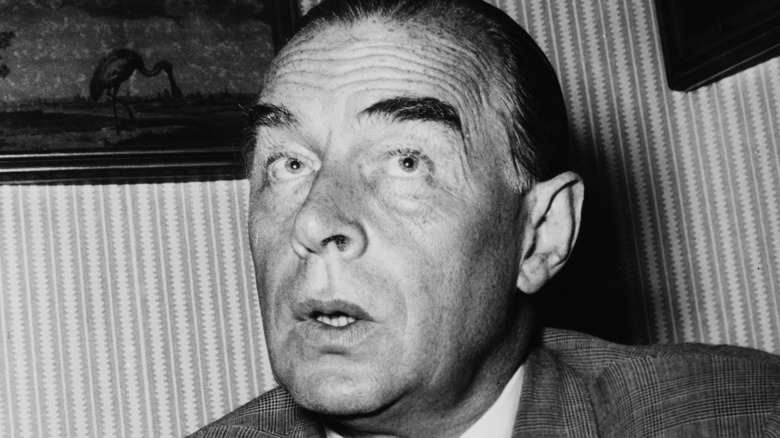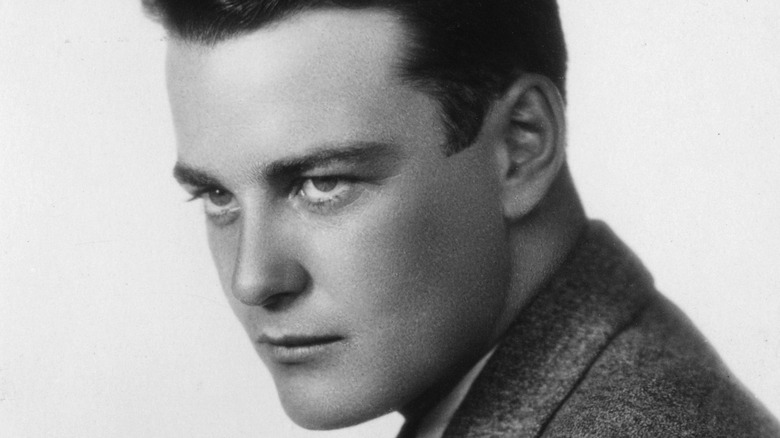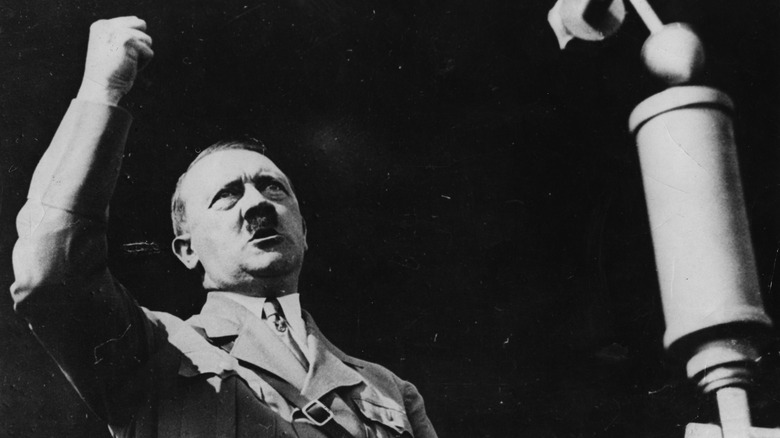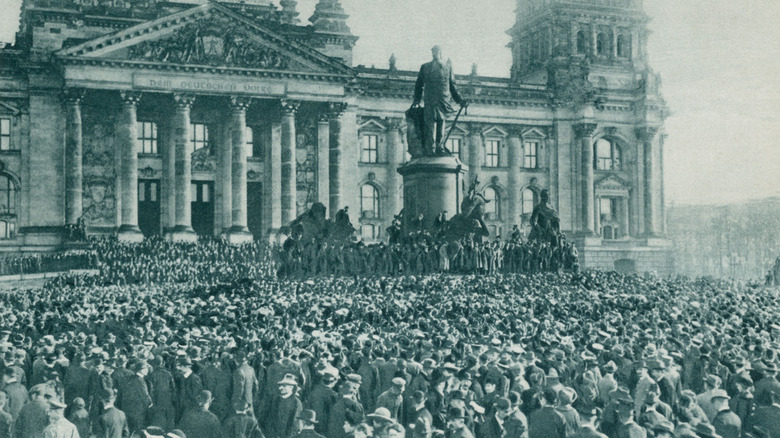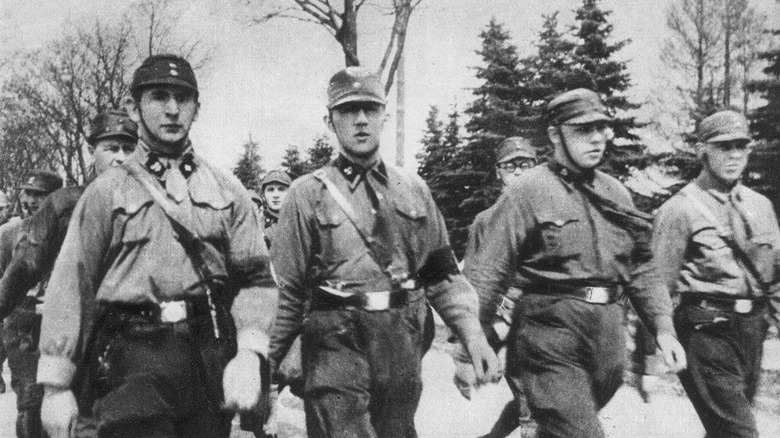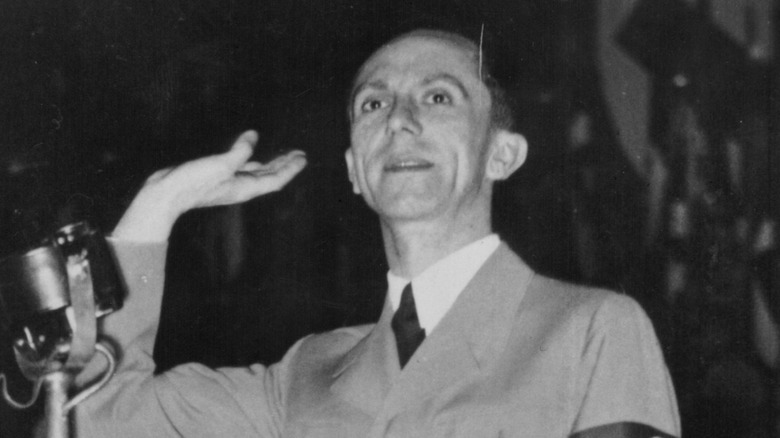Why Nazi Germany Banned The Novel All Quiet On The Western Front
The suppression of information, limiting free speech, and curbing unfettered expression are all common tactics of fascist regimes, according to Bremerton Schools. Footage of Nazi book burning is now seared into our collective consciousness (via PBS). The Nazi Party reaction to Erich Maria Remarque's classic World War I novel "All Quiet on the Western Front," and subsequent Hollywood adaptation released in 1930 (per IMDb,) is a lesser-known story from the years leading up to World War II's outbreak, as Smithsonian Magazine notes.
The Nazi Party, and the Nazi so-called Brownshirts or Storm Troopers took exception to Remarque's bestselling book, proving the power of narrative in the telling of history. The story also reveals the unsettling ways that the Nazi Party, still ascendant at the time of the movie's release, managed to manipulate and control the German population. These factors and more helped light the flame for World War II's outbreak just a few short years later.
'All Quiet on the Western Front' and World War I
Erich Maria Remarque's classic war novel "All Quiet on the Western Front" tells the story of a young German soldier in World War I named Paul Baumer (played by Lew Ayres in the 1930 film adaptation, pictured above, via IMDb). Most of Baumer's company, many of whom are friends, are dead at the start of the book and Baumer himself is killed just one week before armistice, having returned to the front after spending time at home due to an injury, and a period spent in the hospital. The realist tone of the book resonated with many in that era. It also didn't romanticize war, or the underlying nationalist sentiments that can sometimes cause it (via History).
In 1929, the first year Remarque's book was released, it sold roughly 1.5 million copies. Compare that to Ernest Hemingway's timeless World War I novel "A Farewell to Arms," which sold just 100,000 copies within its first year according to Literary Hub. A World War I veteran, Adolf Hitler was ashamed that Germany lost the war and his Nazi Party believed Germany was cheated by the Treaty of Versailles. In Hitler's view, the Weimar Republic, which controlled Germany by that point, was nothing more than a puppet government which the Allies controlled. The popular anti-war sentiment in "All Quiet on the Western Front" ran counter to Hitler's nationalist objectives, according to the National World War II Museum.
Hitler baselessly claimed Germany was cheated in the aftermath of World War I
The Nazi Party, lead by Adolf Hitler, first grabbed for power around the same time that Erich Maria Remarque's book was released, playing on anxieties among the German population due to runaway inflation, and for many who remembered or perhaps even fought in World War I and who agreed with Hitler, that Germany had been mistreated in the war's aftermath. As early as 1921, some three years after World War I ended, the Nazi Party began to organize, blaming Germany's problems on Jews and Communists, as the National World War II Museum notes.
Soon enough there was a Nazi newspaper, a flag, and even Hitler's very own army dubbed the Storm Troopers. Like Hitler, many Storm Troopers also fought in World War I, and many were disillusioned by life under the Weimar Republic and radicalized by Hitler's rhetoric. In 1923, Hitler and his Nazi army Sturmabteilung, shortened to SA, tried but failed to take power in Bavaria through what would one day be called the Beer Hall Putsch. As a result, Hitler spent time in jail, where he wrote his manifesto "Mein Kampf." By 1930, when the "All Quiet" film adaptation came out, Nazis had yet to take complete control of Germany. Nevertheless, their grip on large segments of the German population was undeniable.
The Nazis became the second largest political party in all of Germany
Only a matter of weeks before the film adaptation of "All Quiet on the Western Front" premiered in German cinemas, Hitler's Nazi Party had pulled off a political upset that no one at the time predicted would happen. As a result of the 1930 German Reichstag elections, the Nazis had earned some 6.4 million votes, much more than anticipated, giving the Nazis 107 seats in the Reichstag, where the German parliament is located, according to Smithsonian Magazine.
One year prior, the movie rights to the international best-selling book had been purchased by Universal Pictures, fittingly enough, on Armistice Day, which marks the end of World War I (per the Ransom Center Magazine). In the grips of a worldwide economic crisis, and with conditions especially bad in Germany, Hitler's nationalist message and rage directed at the treaty of Versailles, as well as purported Jewish-Marxists within Germany and internationally, had clearly resonated. Remarque's portrayal of the German army as anything other than the pinnacle of the Aryan race drew the Nazis ire, and became a target of Hitler's vitriol.
Who were the Nazi Brownshirts?
To full understand the Nazi reaction to the movie premiere of "All Quiet in the Western Front" in the 1930, it's important to know what a fearsome force the Sturmabteilung or Nazi Storm Troopers — also sometimes known as the Brownshirts — really were. The Brownshirts were inspired by Benito Mussolini's so-called Blackshirts, a paramilitary force formed by Mussolini in 1919 to fight back against purported Leftists and Communists within Italy. Soon enough, though, Mussolini's Blackshirts indiscriminately harassed a number of different populations within their own country, much like the Brownshirts would one day do in Germany, as Britannica notes.
The Sturmabteilung fell to disarray after Hitler's failed Beer Hall Putsch in 1923. By 1925, though, the SA reorganized under Nazi Ernst Röhm, and the ranks began to swell. By the time that Hitler came to power in 1933, three years after the "Western Front" movie premiere, the Brownshirts were larger than the regular German army. Tasked with fomenting resistance to communism in Germany, Nazi propagandist Joseph Goebbels turned to the Brownshirts thee years earlier, when the time came to intimidate audiences gathered to watch the premiere of "All Quiet on the Western Front."
Joseph Goebbels' Nazi riot
More than a decade after World War I had drawn to a close, the Nazi pushback toward Remarque's novel and subsequent film adaptation reached a boiling point at Berlin's Mozart Hall. During one screening, Nazi Brownshirts, led by Joseph Goebbels, burst into the theater. Not only was the film itself interrupted, the Brownshirts and Goebbels shouted anti-semitic abuse at the screen and toward the audience such as "Judenfilm," translated from German to "Jewish movie."
Other methods Goebbels and his Brownshirts used to disrupt the film premiere included letting white mice loose in the theater, launching stink bombs in the midst of the crowd, and even spreading sneezing powder throughout the theater, according to Smithsonian Magazine. Following this harrowing incident, the movie was banned in Nazi Germany, and Remarque's 1931 sequel to "All Quiet" called "The Road Back," or "Der Weg zurück" in German, was among the many books burned by Nazi Reich in 1933 once the Nazis took complete control of the country (per Britannica).
